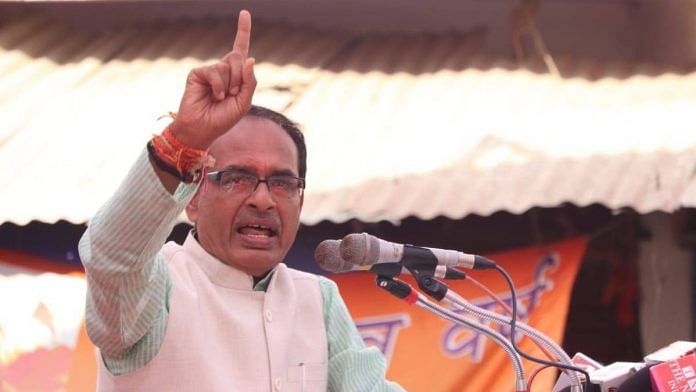New Delhi: Following in the footsteps of the Yogi Adityanath government in Uttar Pradesh, Madhya Pradesh Thursday passed a more stringent law to recover damaged property from protesters.
The Prevention of Damage to Public and Private Property and Recovery of Damages Bill 2021 was passed in the Madhya Pradesh assembly by voice vote without a discussion.
The law would empower proposed claim tribunals to recover twice the cost of damage, with interest, if recovery (of the cost of the damaged property) is not made within 15 days. The similar law in Uttar Pradesh mandates the recovery of only the actual cost of damage.
In the assembly, Madhya Pradesh Home Minister Narottam Mishra said the law will be used to take action against persons who damage private or public property by taking part in processions, riots, protests, communal riots, bandhs and agitations.
He added that the law will also be used to take action against criminals who use explosives and different ‘mafia’ — gambling, liquor, land, forest and mining.
In March, the Uttar Pradesh assembly had passed the Recovery of Damages to Public and Private Property Bill, 2021, and the Uttar Pradesh Goonda Control (Amendment) Bill, 2021.
Under the two legislations, properties of several gangsters have been attached by the state, and damages recovered from protesters, including those who agitated during the anti-CAA protests.
The passing of the MP law — more stringent than the UP law at various levels — shows yet again that Chief Minister Shivraj Singh Chouhan is trying to shed his image of a “soft, liberal” politician and acquire a harder edge to it.
Whether changing names of railway stations with those of tribal or Hindutva icons, passing the anti-conversion Madhya Pradesh Freedom of Religion Bill, or going soft on Hindutva groups like Bajrang Dal who have allegedly repeatedly harassed Christians in the state, political analysts say the four-time chief minister has been working consciously at changing his image.
Also read: Christians say they’re under attack by Shivraj’s MP. Home Minister denies rise in such crimes
MP bill different from that of UP
Unlike in Uttar Pradesh, under the Madhya Pradesh bill, district magistrates and revenue officers have been given the power to initiate recoveries and decide on the final amount of a claim, while an aggrieved individual can approach a claim tribunal for compensation without an FIR within 30 days of the incident of vandalism or destruction.
Under the two UP bills, a person can approach a claim tribunal only after an FIR has been registered and a report from a sub-divisional magistrate (SDM) procured. The final decision on a claim for damages is also vested in the state government.
In the MP bill, ‘owners’, ‘tenants’, ‘lease holders’, ‘jhuggi walas’ and ‘thela walas’ can claim damages for property vandalised during riots or protests. In the UP bill, claims can be filed by only the owner of the damaged property.
Another major distinction — in UP, tribunals can give their decision within a year, while the MP law mandates judgments within three months.
The constitution of claim tribunals under the Madhya Pradesh bill — retired district judges or retired secretary-level officers can be members — is another bone of contention. The Opposition Congress has alleged that such officials can be influenced easily.
Under the UP bill, an additional-secretary-level officer is in charge of determining claims. In Haryana — the other state which has passed a similar law — there is a provision for consulting the chief justice of the high court before nominating members in claim tribunals.
However, the most stringent part of the MP bill is that a tribunal can levy a charge for damages and destruction that can be double the actual cost of the damage. The comparable laws in Uttar Pradesh and Haryana have a provision for seeking an amount proportional to the damage from the guilty party.
When the law was mooted
A state law for the recovery of damage to property, private and public, was mooted when a Bharatiya Janata Yuva Morcha (BJYM) rally was pelted with stones in Ujjain and Indore last year.
“Those who throw stones and cause damage to public property will come under the purview of the law… this law is more stringent than the one in UP,” Narottam Mishra told ThePrint. “It will control anti-social elements, andolankaris and rioters. Whether it’s land mafia, liquor mafia, mining mafia… nobody will be spared. The Congress opposes this bill due to their appeasement politics,” he said.
The Opposition Congress has likened the new bill with the now-scrapped draconian POTA (Prevention of Terrorism Act), and alleged that, like it, this law will be misused against minorities too.
“There is no definition of ‘gangster’, authorities can declare anybody a gangster on their whim and fancy, just like how TADA [Terrorist and Disruptive Activities (Prevention) Act] and POTA was misused. There is as great a risk of misuse of this law by state authorities,” former Madhya Pradesh Advocate General Ravi Nandan Singh told ThePrint.
“There is already a law to deal with rioters, but to arrest people on charges of being ‘mafia’… this will target people who show dissent at government policies,” he added.
(Edited by Saikat Niyogi)
Also read: Why soft-spoken Shivraj Chouhan is now wielding ‘danda’, suspending officials at public rallies



